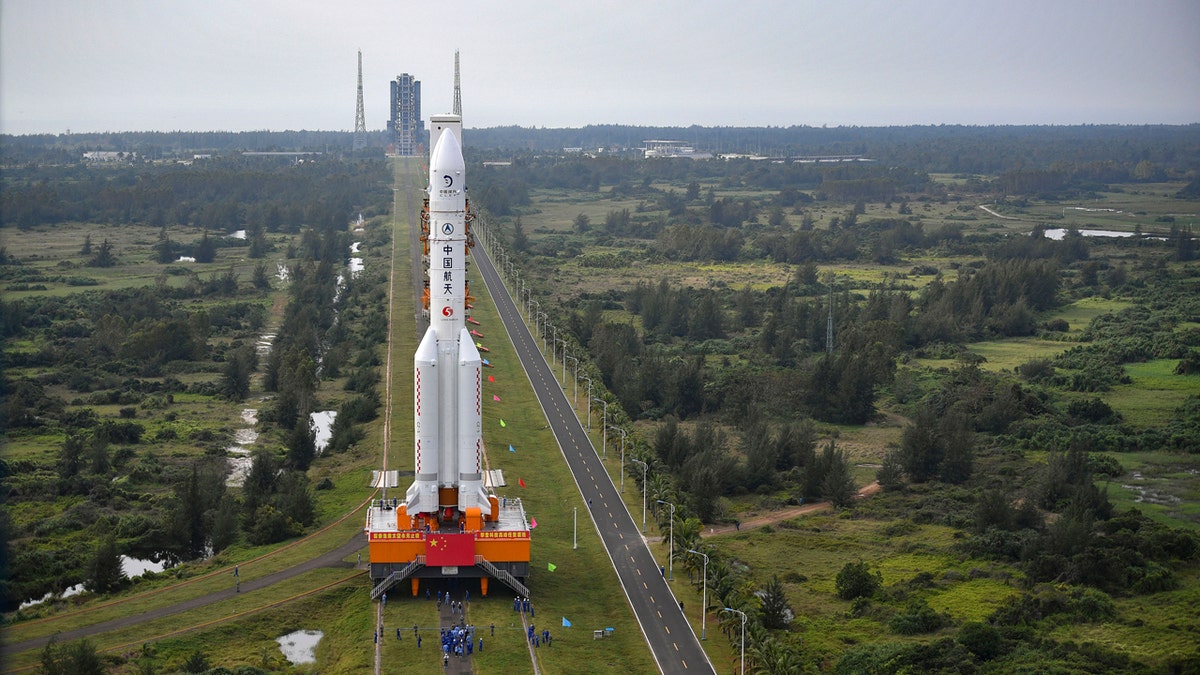NASA begins assembling Artemis space launch system
Margaret Weitekamp, curator at the Smithsonian Air and Space Museum weighs in on NASA's preparation for the future of American spaceflight.
China, which recently landed a probe on the moon, is a serious competitor to the United States in space, according to Vice President Mike Pence.
Speaking during a meeting of the National Space Council at Kennedy Space Center on Wednesday, Pence highlighted China’s recent success in landing an uncrewed probe on the moon in a mission to retrieve lunar samples.
“China is emerging as a serious competitor in space,” he said.
The mission, he noted “raised the red flag of China” on the lunar surface.
Pence, who is chair of the National Space Council, said that similar to the space race that placed American astronauts on the moon, the U.S. continues to face “an era of competition.”
NASA ASTRONAUTS BECOME LATEST SPACE STATION RESIDENTS IN HISTORIC SPACEX CREW DRAGON MISSION
“It’s a competition that America is winning today and we’re going to keep on winning in space for generations to come,” he said.
A new national space policy that reaffirms America's commitment to leadership in space was also launched Wednesday.

In this Nov. 17, 2020, photo released by China's Xinhua News Agency, a Long March-5 rocket is moved at the Wenchang Space Launch Site in Wenchang in southern China's Hainan Province. (Guo Cheng/Xinhua via AP)
After Apollo 11 astronauts Neil Armstrong and Buzz Aldrin set foot on the moon on July 20, 1969, only 10 more men, all Americans, have walked on the lunar surface. The last NASA astronaut to set foot on the moon was Apollo 17 Mission Commander Gene Cernan, on Dec. 14, 1972.
NASA’s Artemis program aims to land American astronauts on the moon in 2024 and establish a sustainable human presence on Earth’s natural satellite. A key element of the Artemis program is landing the first woman on the moon.
“We’re going to honor Gene Cernan’s memory by putting the next man and the first woman on the moon in a few short years,” said Pence.
NASA TESTS BOOSTER ROCKET FOR FUTURE ARTEMIS MISSIONS TO THE MOON
However, some lawmakers have urged NASA to delay putting U.S. boots on the moon until 2028.
2020 has been a momentous year for NASA. Last month three NASA astronauts and their fellow crew member from the Japanese Space Agency boarded the International Space Station following a historic flight in a SpaceX Crew Dragon spacecraft.
The first operational SpaceX Crew Dragon launch marked an important milestone for the space program. Crew-1 follows a successful Demo-2 mission earlier this year and is the first crew rotation flight on a U.S. commercial spacecraft.
Earlier this year the Demo-2 mission marked the first time that astronauts have launched from American soil since the final Space Shuttle flight in 2011.
Speaking on Wednesday, Pence lauded the “renewed American leadership in space” that laid the foundations for 2020’s historic crewed missions. “Those rockets were built by American private industry,” he added.
The newly-created Space Force also made its first launch earlier this year when it sent a military satellite into space from Cape Canaveral Air Force Station in Florida.
CLICK HERE TO GET THE FOX NEWS APP
After the end of the Space Shuttle program, the U.S. relied on Russian Soyuz rockets launched from the Baikonur Cosmodrome in Kazakhstan to get astronauts into space. Russia charges the U.S. about $75 million to send an astronaut into space, and the Associated Press reports that the last Soyuz ticket cost America $90 million.
Fox News’ Chris Ciaccia and The Associated Press contributed to this article.
Follow James Rogers on Twitter @jamesjrogers








































